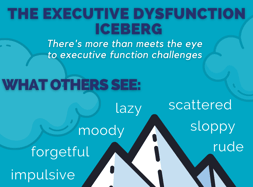You’ve puzzled over plenty of life’s mysteries. Why does food taste better outdoors? Why did that weird ad show up in my feed? Where’s my other sock? When it comes to our kids’ academic performance, one mystery we hear from parents is: “Why is my smart kid struggling?”
I mean, your kid can talk your ear off about black holes, or the Ming Dynasty, or Shakespearean subplots - why the heck can’t they pass in their homework/keep their room clean/stop leaving everything til the last dang minute? It turns out that finding the reasons require a little digging below the surface. Grab a parka and stick with me while I share my favorite analogy - I’m gonna tell you about the Iceberg Effect. And yep, there will be a quiz later, so no multitasking - this is critical stuff to help you understand where your kid is at.
What the Iceberg Effect Reveals
Here’s the top of the iceberg - the part that everyone else sees:

When a kid has the challenges you’re seeing, their teachers, peers, and other adults only see the behaviors that are problematic: the kid is forgetful, seems lazy and scattered, they’re sloppy or moody, they behave impulsively, and sometimes can even be rude to others. But what if you could frame those problem behaviors as symptoms instead of character flaws? Time to look deeper at this…
Remember that icebergs are mostly hidden under the water. You don’t see the vast majority of those Titanic-sinking objects until we explore what lies beneath. When you look further, you can see the specific skill deficits that your kid may have that are causing the problematic behaviors that bug you so much:

Your child may have a poor sense of time or difficulty planning ahead - and that may make them seem scattered and unconcerned about their work. They may have trouble regulating emotions and may become easily frustrated when something doesn’t go their way. When your kid has no strategies to self-monitor, they can be impulsive and not consider the consequences of their actions. Students who are too overwhelmed to get started can appear lazy. When your child has trouble thinking flexibly, it affects their problem-solving and perspective-taking - and that can result in rude or demanding behavior. And when they have no systems to track belongings or to maintain focus, your child can be forgetful.
The Missing Link: Executive Function Skills
What you have here is the missing link - the answer to why your very capable kid is not doing so well. You can categorize all these abilities I just mentioned as Executive Function skills:
- Time management
- Planning
- Persistence
- Managing emotions
- Self-monitoring
- Flexible thinking
- Getting started with work
- Organization
- Focus
- Memory
These abilities tend to develop over time and each person can have a slightly different timetable for the maturation of their Executive Functioning. Unfortunately, your kid’s academic demands don’t account for individual variability. What we often see is that a student’s curriculum can outpace their current capacity to manage everything.
But wait, you may be thinking, “Does this really explain why my smart kid is having such a hard time at school (and at home)?” Allow me to elaborate further…
Knowledge is not the same as productivity. In fact, it’s distinctly different. Your bright kid may be able to understand and discuss topics in science, math, technology, or literature. Or maybe they can think creatively. But what about managing their work demands? Getting work done often requires a different skill set. Executive function skills like planning, focus, persistence, organization, and more are the tools that help us all get work done. Viewed through this lens, you can see exactly why a bright student like yours can be struggling. And the good news is that those skills are coachable skills.
Pop quiz
OK, quiz time. I wasn’t joking around! See how you do (answers below):
- If my kid doesn’t get their work done, they must be lazy.
- Oftentimes, there’s a skill-based reason for behaviors I’m seeing in my kid.
- Kids can’t learn things like organizing or planning. Either you got it or you don’t.
- If my kid doesn’t yet have the ability to manage their demands, they can learn how to.
- Smart kids should automatically be successful in school.
- Executive Function skills are often the missing link to helping a child meet their potential.
Hope for Struggling Kids
For the past 17 years, we’ve worked with thousands of students just like your child (and hundreds of adults, too!). We help kids like yours learn how to get their work done, stay on task, keep themselves organized - and most of all, regain their confidence and optimism about school and themselves. It’s no exaggeration to say that Executive Function coaching is life-changing.
As for life’s mysteries, this one is solved. But what about that missing sock?
Answers: 1: False, 2: True, 3: False, 4: True, 5: False, 6: True
Photo by Tim Mossholder on Unsplash

Download our full-size Executive Dysfunction Iceberg Infographic.

